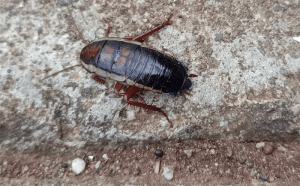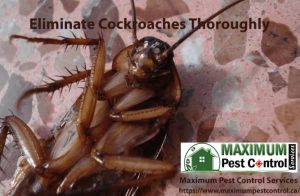
Do Cockroaches Play Dead? The Surprising Truth
Do you ever enter your kitchen in the middle of the night and see a cockroach just lying still? You inch closer, hoping it is dead. It suddenly sprints out of sight and melts into the shadows. A shiver runs down your spine. Do cockroaches play dead?
Well, it may well turn out to be an appalling answer. The actual fact is interestingly shocking. Let us go into the mysterious world of these small creatures.
Mysterious Stillness of Cockroaches
German cockroach is an ancient survivor; it is older than the dinosaurs. Over 300 million years ago, they roamed the Earth. But more legendary is their ability to adapt. Are they able to play dead with the cunning?
Playing dead out in the wild is called thanatosis. This is a form of defense employed by some creatures to throw off predators. Classic are the possums. Some insects do it too. But what about American cockroaches?
Do Cockroaches Really Play Dead?
Contrary to this popular belief, cockroaches don’t play dead on purpose. They just lack the guile for such theatrics. Their behavior sometimes could seem this way.
When extreme danger is presented, they will sometimes freeze. Their bodies undergo what is called tonic immobility. It is an involuntary paralysis-not a deliberate act.
A pesticide exposure can flip them onto their backs. An overloading of the nervous system causes muscle spasm. They appear lifeless. But if the toxin fades, they may revive.
The Science Behind the Stillness
Have you ever seen a cockroach lying on its back with its legs up in the air? A common enough sight after the application of an insecticide, this is not some kind of dramatic pose but the result of their nervous system being overwhelmed with toxins. Their muscles spasm, causing them to flip onto their backs. Once there, their weak leg muscles struggle to right themselves, especially on smooth surfaces.
Temperature also influences. Due to Ectothermic conditions, take their body temperature from the environment. In cold temperatures, they become sluggish and look dead. After getting warmed up, they are mobile again.
The Truth About Their Resilience
Cockroaches do have some survival instincts that are nothing short of fascinatingly disturbing. They can hold their breath for up to 40 minutes. This aids in their survival both underwater and without oxygen. They have even been found surviving after being flushed down drains.
Perhaps an even more unsettling fact than this is that they are able to survive without a head. They could survive as long as one week beheaded. Given the fact that they have spiracles on their body segments through which they breathe, they do not use their mouths or heads to breathe. They eventually would die from dehydration since they are unable to drink water with their mouth missing.
The Myth of the Unkillable Cockroach
From this resilience, myths of invincibility have arisen. Many believe they can survive a nuclear holocaust. While they are much more resistant to radiation, they would not survive extreme doses from a nuclear blast. Still, their tolerance is remarkable, having survived radiation levels as high as 15 times over the lethal dose for humans.
It’s this simplicity that makes them hard to kill. Their capabilities for quick adaptation generally mean that the traditional methods fail. They build up resistance to pesticides over generations, thus it is really quite a challenging pest to control.
Why Do They Seem to Rise From the Dead?
It is not playing tricks on you when you think that is dead and then springs back to life. It may have been incapacitated for the time being. Very cold temperatures and exposure to mild toxins can do this. When their body recovers or when their bodies warm up, they become active all over again.
This is where most of the illusions that these creatures play dead come in. Actually, they are just withstanding the bad conditions and recovering whenever possible.
Psychological Effects of Encountering Cockroaches
Cockroaches stir emotion in the human spirit. Their sudden movements, nocturnal nature, make them an ambush-an unexpected terror waiting in the wings. On top of that, the suggestion they can feign death. It’s like playing a cruel joke on us.
Knowing how they react lowers the level of unease caused. They don’t think up ways to try to fool anyone. They’re elementary organisms reacting to their surroundings.
The Role of Pesticides
Pesticides are among the more common apparatus used against cockroaches. The misuse of the same, though, causes the very well-known phenomenon “playing dead.” Some chemicals cause malfunctioning to the nervous system of the insects. They may have paralysis that will temporarily take effect or even recover later.
They would only result in a build-up of resistant cockroach populations. Chemical control is less effective. IPM methods that integrated sanitation and exclusion along with targeted treatments were far more effective.
Cockroaches in the Ecosystem
While they are pests to our homes, cockroaches do play a role in the ecosystem. They function as decomposers in nature. They help in breaking down organic material into soil, returning nutrients back into it. This supports plants’ growth and contributes to their healthy ecosystems.
Understanding their ecological function doesn’t mean we must go on putting up with them indoors. But such a realization places them in perspective about their role within the natural world.
Myths and Misconceptions
Cockroaches are draped in myths. Let’s dispel a few:
- Only Dirty Homes Have Cockroaches: Not true. While cluttered homes offer more hiding places, can invade any space that has food and water.
- They Can Survive Nuclear Explosions: Partly true. They are more resistant to radiation than humans, but not impervious at very extreme levels.
- They Serve No Purpose: Wrong. They are crucial decomposers in many ecosystems.
The Need to Act
An ignored cockroach infestations doesn’t go away. In fact, it can get out of hand. Cockroaches breed with exponential rapidity. One female could mean hundreds of babies in under a year.
They also pose health risks. The cockroaches carry the bacteria and germs. They excrete their droppings on the food and surfaces. Their droppings could also trigger allergic reactions, asthma- worst in kids.
Being proactive will defend your health and home.
Conclusion
Do cockroaches play dead? No, they don’t. Their usually motionless condition occurs because of physiological responses against stresses, toxins, and environmental conditions. While it may seem that they actually play dead, that is indeed not a conscious behavior. Their real survival abilities are so much more surprising and honestly rather ghastly.
Cockroaches are the ultimate survivors; they are a true testimony to their evolutionary success, as they have virtually all the stamina. Though unwelcome in homes, knowledge of them pays dividends in control and prevention of infestations.






